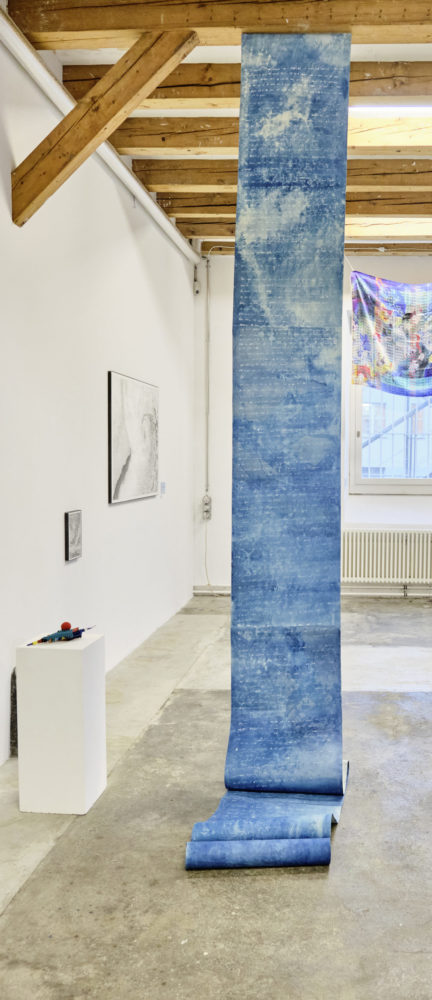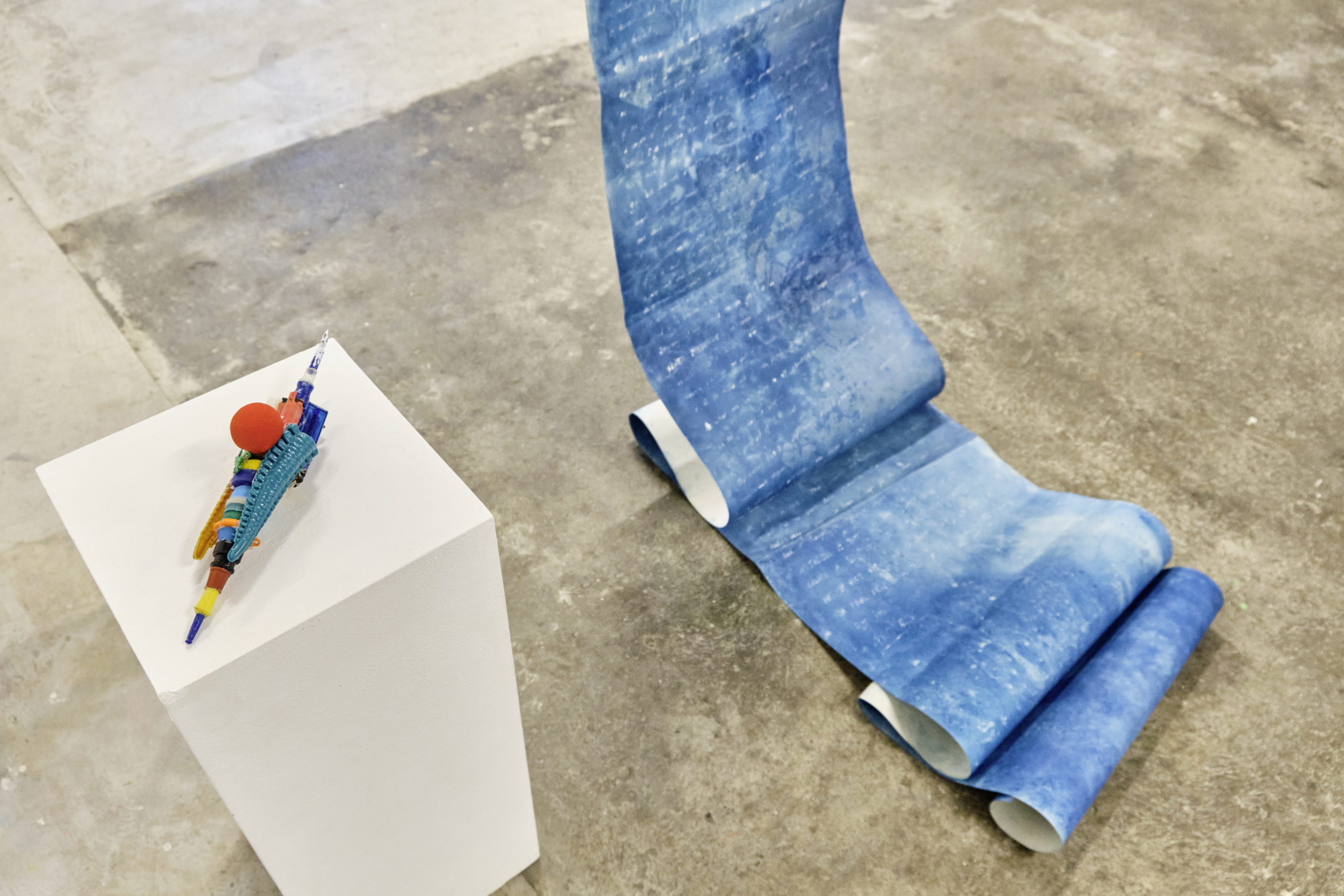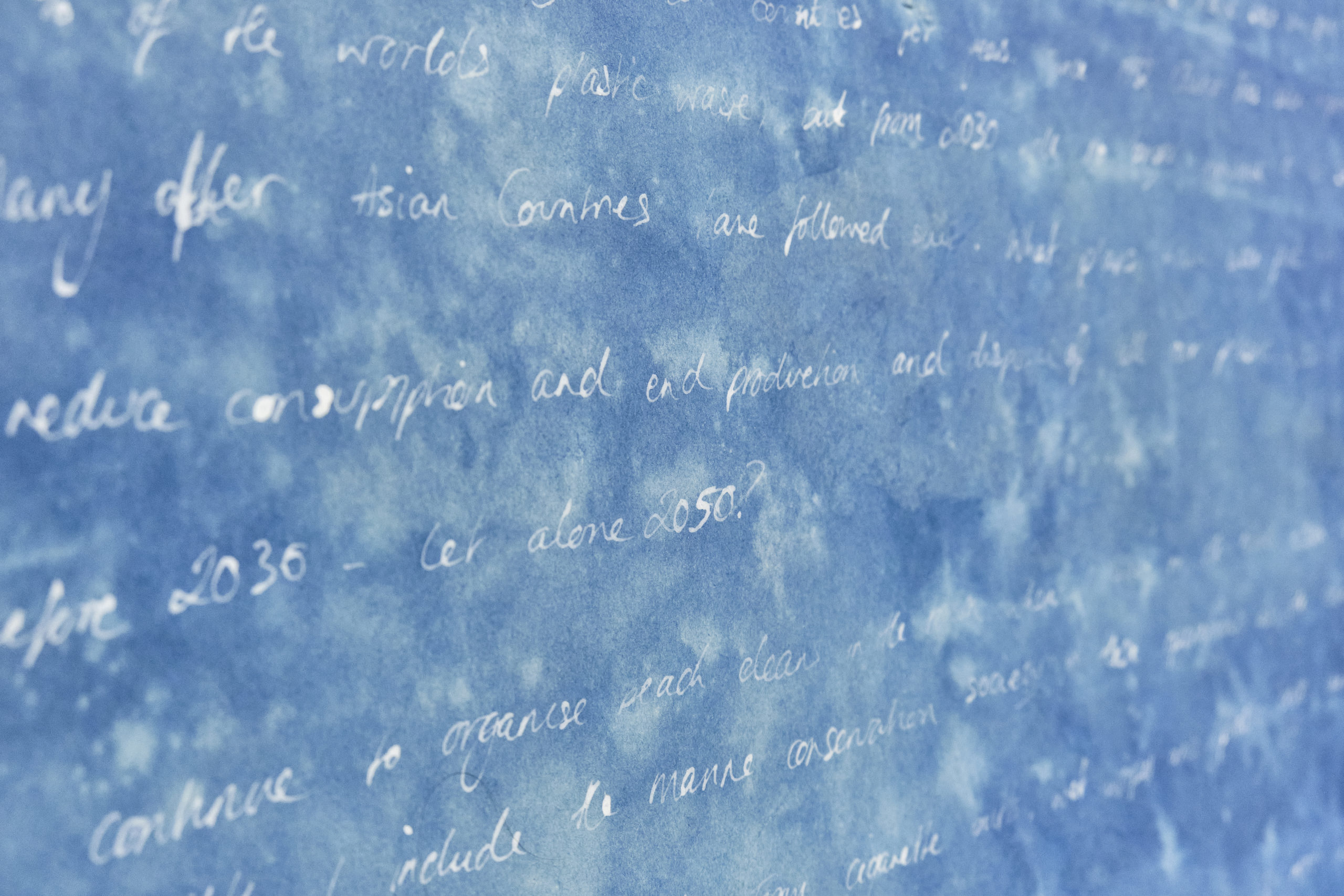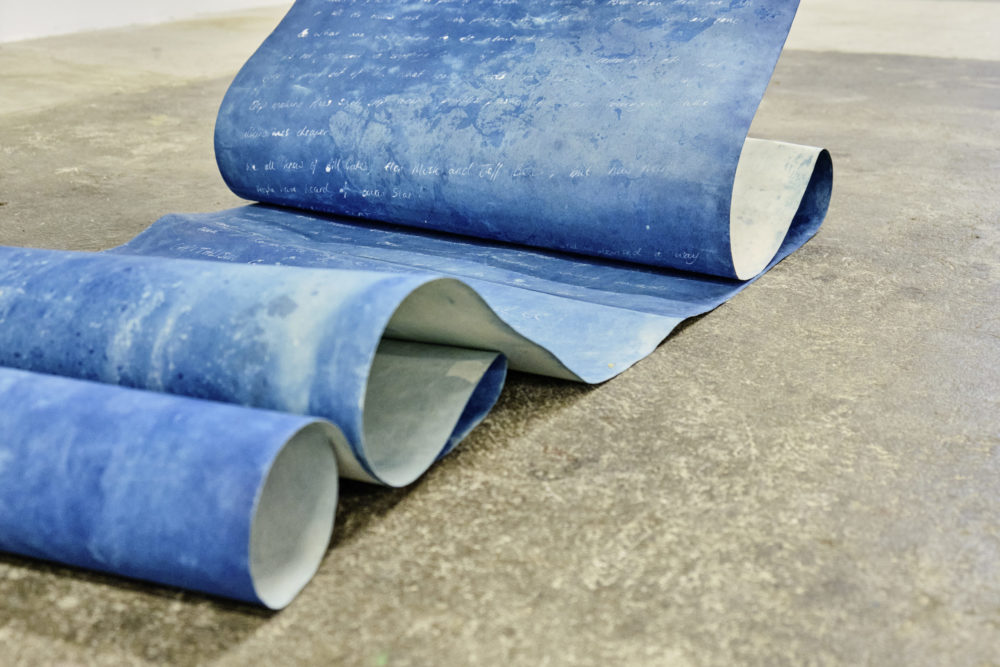Dead Seas Scroll: How long is long enough?
Jane Stewart
Born in Essex, with a BA (Hons) Degree in Fine Art from Colchester School of Art, multimedia artist Jane Stewart has been an environmental activist and diving instructor for nearly 30 years, her passion is conservation of the oceans. She uses her work as a vehicle to raise awareness, as a call to action and activism and start a dialogue about our relationship with the environment in a global consumerist society.
Dead Seas Scroll: How long is long enough?
With the sea, tide and tideline as an active participant, this giant scroll also has a 2300 word biographical essay, handwritten with the ‘plastic pen’ about my own experiences of the plastic pandemic, it is a comment on the death of marine life by 2050.
The issues of overfishing, the plastic pandemic, climate change and global warming are not new problems for the world, we have had many years to make the change, to find solutions, but still, we continue to destroy this fragile ecosystem.
How long is long enough?
Essay Dead Seas Scroll
My first experience of plastic pollution was in 1992/1993. I had just arrived in Hong Kong and was living on one of the outlying islands. The local beach was a narrow strip of sand with a view of mountains rising up from the sea with a small pagoda in the distance, at the other end of the beach was a huge coal fired power station. At night it looked like a funfair with all the lights, but during the day, the three chimneys, buildings, pipes and conduits were a total eyesore.
My first visit to this beach was with a few friends one afternoon, I was shocked by the amount of rubbish on the tideline, not just the tideline, but up in the bushes behind the beach and strewn across the cable road that fed into the power station from across the island. Mostly Styrofoam and polystyrene boxes, but bottles, cans, and general plastic detritus that had floated in on the incoming tides. We humans have a great way of blocking out what we don’t to see. I was amazed by my friend’s attitude to this amount of rubbish, comments like ‘Oh, it’s always like this’. We become inured to things we see every day. Even now I watch people at the beach, when a food wrapper tumbles past them, caught in the breeze, they look through it, don’t even notice that it’s there. They stub out their cigarettes in the sand, leaving the butts behind, oblivious to the damage they are causing by that simple act.
From this visit to the beach in Hong Kong, the Hong Kong Beautification Society was born, after meeting with a German guy called Dirk and his girlfriend Kim, who took the idea and ran with it. I was not an active part of the running of the group but helped with organising beach clean-up events around the island on which we all lived. One such beach was Mo Tat Wan, in the North of the island, very hard to reach on foot at the time, it faced the South of Hong Kong Island and was basically a small community of a few houses with not a lot else there. We hired an old wooden junk to take all the volunteers round to the bay, so we could have access easily, there was a small jetty, once stepping off the boat, floating beside this jetty was a dead dog, one of the islands street dogs no doubt, but bloated and floating like a balloon. This has got to be one of the most depressing beach cleans I have ever been on. There was the usual bits of Styrofoam and polystyrene lidded box from the local fishermen, who use them to store live fish to transport to local markets and restaurants. There were several really disturbing finds that we made that weekend, the first being the amount of used syringes, bottles of pills, drip bags and catheters that had washed up on the beach. This was medical waste, not waste from drug abuse, but actually dumped into the sea by the Hospital in Aberdeen across the water. By researching into the names of the doctors names on some of the bottles, the Hong Kong Beautification Society was able to prosecute the hospital for dumping toxic waste. All of this should have been incinerated very carefully as it was medical waste. We had no idea what the pills and potions were in the bottles and vials, but if these had leaked, as some had, into the water, the effects could have been disastrous for marine life. There is no information available to show how long this practice had been continuing. That is the problem with a huge population in a tiny place, there are just not the facilities to deal with all the rubbish. I remember seeing from the ferry, dustcarts driving into the side of a large rock hill to unload their waste inside a huge cave hollowed out from the mountainside. This was nearly thirty years ago, I wonder if that mountain has been sealed up now, what will happen to that waste inside? It’s the same thing as landfill, nothing ever goes ‘away’. The second disturbing finding was the amount of plastic sand. Tiny particles of plastic that were effectively the same as sand granules. We dug a pit about 6 feet deep, just to see if we could work out a timescale for this, but at six feet down, we called it a day. The plastic sand was just as bad at six-eight feet as it was on the surface, so the granules must have been breaking down form the surface plastic for a great many years. Remember this was in 1992/3, so how bad is it now?
According to the Natural History Museum in 2015 a team of scientists on Henderson Island, one of the most isolated places in the world, discovered more than four billion plastic particles in the top five centimetres of sand. I would love to say that as Mo Tat has become more of a tourist destination with more houses and a larger community, that things have changed for the better, but during my research I found a Facebook page entitled ‘Clean Up Mo Tat Wan’, some of the pictures show a disturbing amount of plastic still washing up on the beach and creating more plastic sand thirty years later. At least there are people in the community who are trying to do something about it.
Plastic pollution is not down to just you or me to solve, this issue has to be tackled at a grass roots level, it simply has to stop being created. Every piece of plastic you have ever used still exists in one form or another, and more is created every day in larger and larger quantities. This plastic has to go somewhere, and unfortunately South East Asia, being the manufacturer of the planet, with limited resources to dispose of waste, just brush it under the carpet by dumping in the sea or hiding it inside a mountain. At least it’s gone ‘AWAY’ right? If you think we in the West are any better, we are not, we have been shipping our waste to developing world countries for years. Since 1992 China has been importing forty fiver percent of the world’s plastic waste,2 but from 2030 will no longer continue to do so. Many other Asian countries have followed suit. What plans have been put in place to dispose of all our plastic waste before 2030, let alone 2050? I continue to organise beach cleans in the town where I live on the North East Coast of Essex, I include the Marine conservation society in these clean up operations as they count and make records of everything they find, especially things like cigarette butts and wet wipes, plastic bags and, more recently, surgical masks.
The beach near my house is supposedly a blue flag beach with good water quality, however on the beach and between the beach huts there are so many cigarette butts that it gets too many to count. Each cigarette manages to pollute a litre of water and the soil surrounding it. I cycle a lot, and on my cycle rides I try to stop along the beach path and collect the plastic rubbish I find, enough to fill the basket on the front of my bike. The things I find most are plastic bottle tops, pieces of rope, lighters and tampon applicators. These are the things that annoy me the most. These applicators used to be paper, or, the ones I used, just nothing, just use a finger. If you can’t put in a tampon without the need for a plastic applicator, how are you supposed to know your own body well enough to give yourself pleasure? I called Proctor and Gamble who make these applicators. They say they are just responding to demand, but if they never made the things in the first place, there would be no demand.
But that’s capitalism all over isn’t it, create a need and fill that need. About eighteen years ago I started using a menstrual cup, one piece of plastic. I have been using it ever since, never paid a single penny on sanitary products ever since. For eighteen years. Never. Not Once! Fucking capitalism up one little piece at a time. A couple of years ago I did a project that focussed on the Pacific garbage Patch. I huge swirling gyre of varyingly degrading plastic in the middle of the Pacific, there is one in the Atlantic too, in fact, there are small plastic gyres all over the planet. at the estuaries of rivers where river water meets coastal water and creates a swirling movement, plastic is trapped to move around and around in a vortex for as long as the plastic exists. A local fisherman told me about a patch near to the mouth of the river I live beside.
Boats drop their rubbish in the sea, rather than paying to dispose of it on Land in the UK, it is then unregulated and it just keeps swirling round, getting caught in old nets that eventually sink, due to the weight of the detritus, this rope then deteriorates and starts to float back up to the surface, collecting more debris it sinks again and the circle continues, while all this plastic soup swirls round in it’s everlasting vortex.
My findings over the years when it comes to plastic pollution, or as I call it, the plastic Pandemic, the concept that there will be more plastic than fish by 2050 is just a ridiculous notion. There are probably more tiny, microscopic pieces of plastic on one beach in South East Asia than there are fish in all the oceans and it has probably been like that for a very long time. So what are we going to do about it? It’s not about you and I stopping the use of plastic bottles, straws, cotton buds etc. Though that helps a tiny bit, what really needs to happen is for industry to stop making this shit, stop creating pointless items and components from plastic and start looking at making alternatives cheaper. Hempcrete, plant based plastics and compostables. We all know the name of Elon Musk, or Jeff Bezos, Richard Branson and Bill Gates, but how many people have heard of Boyan Slat? Who is Boyan Slat? He was the young Dutch guy who, at eighteen years old, devised a way of collecting the plastic waste in the gyres around the globe. ‘The Ocean Cleanup’ has been collecting plastic waste from the ocean since 2013, they are now collecting waste from rivers, the capillaries that feed the oceans in South East Asia too. 3 There are also many small start-up businesses that are starting to utilise marine plastic as a material, although it is still plastic, at least it is being removed from the sea and actually used.
So while Steve Bezos is trying to find ways of getting to space, because he wants to escape a fucked planet, Boyan Slat is trying to save us all from the plastic shit that Steve Bezos delivered to us in the first place. Boyan Slat, remember that name and use it often! ‘Mediated Matter’ is a group, the brainchild of Neri Oxman at MIT who have developed and created an experimental biopolymer, a bioplastic, made entirely of materials that will naturally decay at the end of their useful life. Cellulose, Pectin, Calcium Carbonate and chitosan (made from insect and shrimp exoskeletons) which can be 3D printed into any shape, but designed to decompose naturally at the end of its natural life.
In 2016 at a Japanese waste dump, scientists discovered an enzyme that breaks down plastic, and in 2018 researchers from the University of Portsmouth managed to recreate this in a lab and which started breaking down the plastic on just a few days. In 2020 a French company claimed they had also created a similar enzyme that degrades up to ninety percent of all plastics within hours. Other researchers are currently working towards a bug that can break down polyurethane, a widely used but rarely recycled plastic. So there is hope for the future, but we need to change the way we think. CAPITALISM IS NOT WORKING, GREED WILL NEVER CRETE A SOLUTION. THE GLOBAL COMMUNITY HAS TO ACT NOW. WE CANNOT WAIT, WE ARE IN THE FINAL MINUTES OF THE 11TH HOUR. ACT NOW! PROTEST!


















